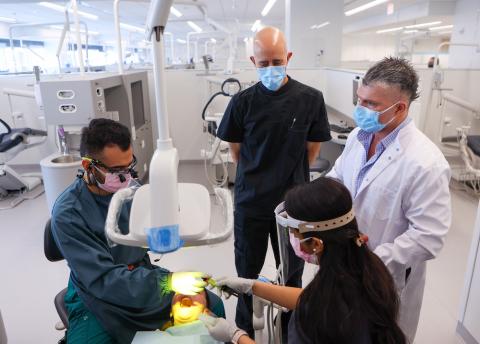As featured in the School of Dental Medicine Winter 2021 Magazine
The Preceptor Program—among the first of its kind—provides critical hands-on learning experiences for students
When Professor Ronald Occhionero (DEN ’61), DDS, established Case Western Reserve University School of Dental Medicine’s Preceptor Program in 1966, it was the first of its kind in the country—bridging the gap between a student’s preclinical studies and successful treatment of patients.
Under the guidance of preceptors—seasoned, accomplished dentists—students learned to treat their patients in a more comprehensive fashion. No longer did students think of someone as a root canal patient or bridge patient; instead, they learned to provide holistic care and make referrals to specialty departments as needed. The program transformed the clinical learning experience from a standardized, lockstep approach into one more reflective of a personalized private practice.
Over time, the Preceptor Program grew to include first- through fourth-year students—though the majority of work begins in the third year, when students begin significant clinical activity.
The preceptors, who teach two-and-a half days each week, serve eight student groups and, it is estimated, provide 70% of a student’s clinical education in the dental school. Students remain with their assigned preceptor group throughout their dental school tenure, giving them tangible experience working in an environment similar to a private group practice. (In addition to learning from their faculty preceptors, students also benefit from full-time faculty members who teach restorative dentistry and provide clinical assistance.)
One of the core elements of the Preceptor Program’s success is the professional, constructive relationship between the students and preceptors: They must work as a team to analyze the evidence, reach a diagnosis, establish a strategy for care, and communicate effectively with the patient. Simultaneously, the students draw on the preceptors’ knowledge and experience, while the preceptors evaluate the students’ abilities to apply evidence-based principles and demonstrate comprehensive knowledge of patients’ conditions. Ashleigh Kmentt said learning from her two preceptors in the clinical setting during her third year has been invaluable to her education.
“Every preceptor has their own unique passions for niche areas of dentistry, and that passion certainly comes alive in the context of mentoring a student,” she said. “I have already learned so much in just a few short months, so it is very exciting to think that this is just the tip of the iceberg.”
For Mario Alemagno (DEN ’88), DDS, who previously was a preceptor and now is a senior instructor of comprehensive care, the opportunity to learn from his peers and see the different teaching style each brings to the program to enhance the student experience is highly appreciated.
“You must always remember that each student is an individual,” Alemagno said. “There are many different personalities as well as skill levels in each class that you must learn to accommodate—challenging highly skilled students while bringing along those who need more attention requires patience and understanding.”
In his work, Alemagno focuses on teaching people skills alongside hand skills, offering students advice on mannerisms to make patients feel comfortable, such as entering the room and tone of voice. Seeing preceptors’ soft skills firsthand has been a “stand-out experience” of the program, Kmentt said.
But the greatest reward of being a preceptor, Alemagno said, is forming bonds with students and watching them excel in the procedures he’s taught.
“Being able to meet the distinct needs of each student,” Alemagno said, “is really the art of it.”
The personalized and professional approach of the preceptors is one the students appreciate, especially as they enter the relatively unknown world of clinicals.
“I knew [working in the Dental Clinic] would be challenging, but a welcome challenge. However, I could not have predicted how fun and upbeat that challenge would be, thanks to having mentors who guide us not only in the concrete skills of dentistry, but also how to enjoy it along the way,” Kmentt said. “We begin our intensive clinical studies as third-year students having learned the basic tools for success, but it is thanks to the mentorship of our preceptors that we are able to use these tools to create something wonderful for our patients.”
—Article written by Whitney Bohan


